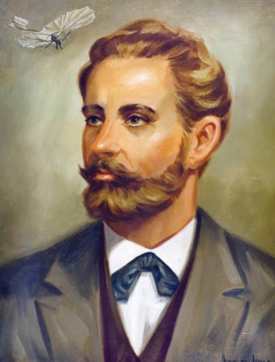 A 19th century German pioneer aeronautical experimentalist, Otto Lilienthal was the first to recognize the importance of providing positive stability and control before successful heavier-than-air manned flight could be achieved. He was also the first to confirm the desirability of cambered wing surfaces, as advocated by earlier theorists, through actual flight test. Mechanically talented from childhood, he graduated from the Berlin Trade School and founded a factory in which he manufactured boilers, iron pulleys, and siren whistles of his own design. Fascinated by the dream of flight, he studied aeronautical theory throughout his life. In 1891, with his brother Gustave, they produced their first successful glider. It was a frail craft, half bird, half butterfly in shape, constructed of willow wands, waxed cloth and wire, with a weight of only 40 pounds. Hanging from a bar beneath the craft and guiding it by shifting the weight of his body, he launched himself into graceful flight by leaping from a hill in the center of Berlin. He made over 2,000 such flights in the succeeding 5 years. Each step forward was made only through meticulous investigation, and each result was carefully recorded. His experimentation was carried forth in true scientific method and published in a treatise, “The Carrying Capacity of Arched Surfaces in Sailing Flight.” In freely publishing his works, he both inspired and led other experimenters, notably the Wright brothers. In 1896 he turned to the consideration of powered flight and constructed a biplane with movable wing tips that was powered by a small motor operating on carbonic acid gas. Before he could test this creation, he was fatally injured when one of his early gliders stalled at an altitude of 50 feet.
A 19th century German pioneer aeronautical experimentalist, Otto Lilienthal was the first to recognize the importance of providing positive stability and control before successful heavier-than-air manned flight could be achieved. He was also the first to confirm the desirability of cambered wing surfaces, as advocated by earlier theorists, through actual flight test. Mechanically talented from childhood, he graduated from the Berlin Trade School and founded a factory in which he manufactured boilers, iron pulleys, and siren whistles of his own design. Fascinated by the dream of flight, he studied aeronautical theory throughout his life. In 1891, with his brother Gustave, they produced their first successful glider. It was a frail craft, half bird, half butterfly in shape, constructed of willow wands, waxed cloth and wire, with a weight of only 40 pounds. Hanging from a bar beneath the craft and guiding it by shifting the weight of his body, he launched himself into graceful flight by leaping from a hill in the center of Berlin. He made over 2,000 such flights in the succeeding 5 years. Each step forward was made only through meticulous investigation, and each result was carefully recorded. His experimentation was carried forth in true scientific method and published in a treatise, “The Carrying Capacity of Arched Surfaces in Sailing Flight.” In freely publishing his works, he both inspired and led other experimenters, notably the Wright brothers. In 1896 he turned to the consideration of powered flight and constructed a biplane with movable wing tips that was powered by a small motor operating on carbonic acid gas. Before he could test this creation, he was fatally injured when one of his early gliders stalled at an altitude of 50 feet.
Inducted in 1972.
Portrait Location: Hall of Fame Hallway
2001 Pan American Plaza, San Diego, CA
Phone: 619.234.8291
Información En Español
Contact Us
We would like to thank all our sponsors who help us make a difference. Click here to view all who help us.

The San Diego Air & Space Museum is a 501(c)(3) non-profit organization. Federal Tax ID Number 95-2253027.
